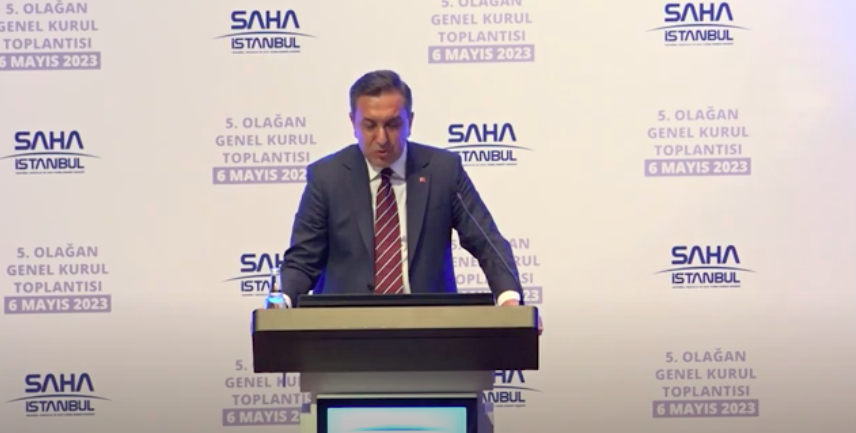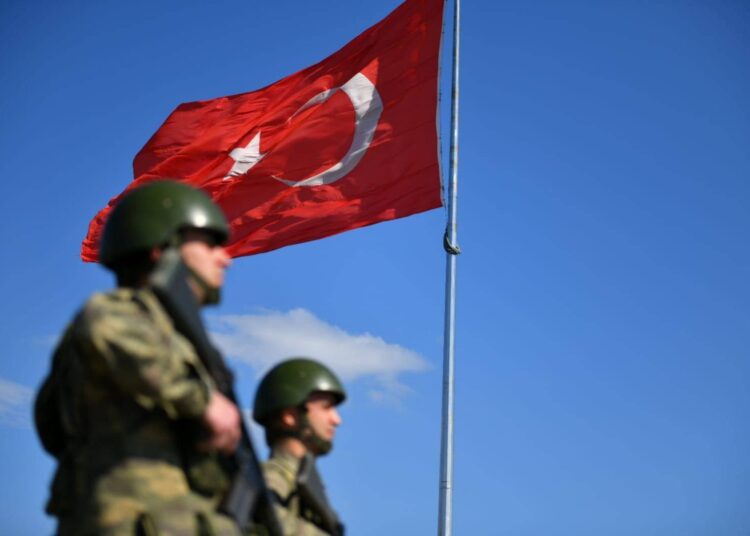Levent Kenez/Stockholm
Turkey’s deputy minister of defense admitted that the government cannot fully meet the needs of the military in terms of supplying it with new equipment and weapons due to the poor state of the Turkish economy, during a Sunday meeting of a pro-government business platform that brings together industrialists from around İstanbul.
Speaking at the general assembly of the SAHA Istanbul Defense, Aviation and Aerospace Platform led by Haluk Bayraktar, brother of Turkish President Recep Tayyip Erdogan’s son-in-law and CEO of military drone producer Baykar Makina, Deputy Defense Minister Muhsin Dere said Turkey’s defense spending has decreased in recent years. According to Dere, the reason is not a decrease in needs but rather a decrease in purchases.
Dere said Turkey would soon have to supply the military with a large amount of equipment and weapons.
“God willing, Turkey’s economic situation will be much better, and we will meet the needs of the army from A to Z,” he added.

Turkey’s military expenditures amounted to $10.6 billion last year, a decrease of 26 percent compared to 2021. Turkey ranked 23rd among the countries with the highest military spending last year.
According to data from the International Peace Research Institute (SIPRI), headquartered in Stockholm, global military expenditures have slowed this year due to inflation, despite reaching a record level last year.
Global military spending increased by 3.7 percent in 2022, impacted by Russia’s war in Ukraine, to an all-time high of $2.24 trillion.
Haluk Bayraktar, chairman of the board of SAHA Istanbul, said while Turkey increased its defense and aerospace turnover and exports, on the other hand, it had transferred fewer resources for the importation of military goods and claimed that defense expenditures fell thanks to increased domestic production.
The Erdogan government has been facing increasing restrictions, embargoes and sanctions on the defense industry not only by its NATO allies but also by its trading partners such as Russia over growing concerns that it may harbor irredentist ambitions. The restrictions and in some cases the ban on the sale of military goods and defense industry products as well as precision machine tools is a direct response to Turkey’s military adventurism in cross-border operations that have extended from Libya to the Caucasus and from Syria to the eastern Mediterranean in recent years.
The first public revelation that Turkey has come under an embargo on dual use goods for civilian needs on fears they may be used for military purposes came from Defense Minister Hulusi Akar. Speaking to lawmakers at a parliamentary committee meeting on November 16, 2021, Akar said: “We are really faced with undeclared embargoes. We can’t get the desired response even from some of our allies, not only in these military matters, in the defense industry, but also in other civil production matters on the grounds that they can be used in any way for this or that purpose.”
Nordic Monitor previously reported that sanctions and export restrictions imposed on Turkey’s ambitious defense industry had taken a toll on the development of sophisticated military hardware, which suffers from the lack of domestically produced components, in particular critical engines and transmission systems.
In an interview with a Turkish TV station on September 4, 2022, İsmail Demir, head of the Presidency of the Defense Industry (Savunma Sanayii Baskanligi, SSB), Turkey’s top defense procurement agency, admitted that the agency has faced challenges in developing power packs including engines and transmissions for various defense projects.
It’s not only the parts but also a shortage of qualified engineers that is hindering progress, he stated.
“The engine issue is a known [problem]. As for trained personnel and expertise, we also don’t have extensive experience. There are a limited number of experts [in Turkey],” said Demir, who was sanctioned by the US over Turkey’s purchase of the Russian S-400 long-range missile system.
Turkey has a number of national aircraft and tank projects, but they suffered a setback because of the difficulty in finding engines and transmission systems to power the equipment.
Turkish Foreign Minister Mevlüt Çavuşoğlu also stated at the Istanbul Security Forum organized by the government, which he attended online last week, that the sanctions imposed on Turkey by NATO allies are unacceptable and contrary to the spirit of the alliance.
The defense industry is one of the issues that Erdogan has brought up the most at election rallies before the May 14 presidential election. One of Erdogan’s election strategies is to show voters that Turkey is becoming stronger by promoting domestically produced defense industry products.












